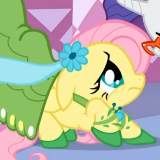Grammer a Week 16: Oxford Commas · 3:01am Mar 3rd, 2016
This is Grammer a Week, the periodic blog program-thing where I soapbox about a grammar subject I find interesting. You might, too! This week's installment is about the Oxford comma. Also known as the serial comma, the Oxford comma is a subject of intense debate among grammarists. Not as vicious as, perhaps, the debate about single vs. double spacing, but it's still something you'll see people screaming about.
First off, what is the Oxford comma? It's that optional comma at the end of lists. In a series of three or more elements, you have a choice of whether you'd like to demarcate the penultimate and final elements with a comma or not.
Fluttershy picked up apples, cucumbers, and carrots.
Fluttershy picked up apples, cucumbers and carrots.
The first sentence uses the Oxford comma, and the second sentence does not. Technically, you can choose to either include or remove the final comma, and either way, you'd still be correct, so long as you used your conventions consistently.
There is a bit of location bias that goes into whether you use the Oxford comma or not. American English favors its use, while British English tends not to.
So, where's the debate? When reading the above sentences, it's not as if either of them is particularly unclear or reads choppily. Well, it turns out that there are a few odd cases you can come up with that make it so that the Oxford comma is necessary for clarity.
When Fluttershy returned home, she saw her friend, the detective and the seamstress.
Let me ask you this question: how many ponies are in Fluttershy's home? Because this sentence is unclear, there are, in fact, two possible answers. It could be there are two in her house: Fluttershy and her friend Rarity, the latter of whom is both a detective and a seamstress. Alternatively, there could be four: Fluttershy, the homeowner; Rarity, the friend; Shadow Spade, the detective; and Coco Pommel, the seamstress.
When Fluttershy returned home, she saw her friend, the detective, and the seamstress.
With the Oxford comma, now there are most definitely four.
Grammarians love to quote examples like the one above to convince people that the Oxford comma is necessary for clarity. But for fear of appearing one-sided, there are also some cases that argue against the Oxford comma.
Fluttershy asked her friend, "What are you doing here? I thought you were going to see the baker, Pinkie, and Twilight."
Now let me ask you this question: how many ponies is Rarity going to see? Because this sentence is, again, unclear, there are two possible answers. She could be seeing two: Twilight and Pinkie, the latter of whom is a baker. She could also be seeing three: the baker, Mrs. Cake, along with two others, Pinkie and Twilight.
Fluttershy asked her friend, "What are you doing here? I thought you were going to see the baker, Pinkie and Twilight."
Without the Oxford comma, now she is most definitely seeing three. Confusing, isn't it?
All in all, where do I stand on this debate? As a follower of the Chicago Manual of Style and a general user of American English, I like the Oxford comma. But if you're not me, and you're more frugal with your commas than I am, you may very well not like it.
I think the real lesson to learn here is not to mix terms with their appositives* in lists. None of the examples I provided above are particularly clear at the best of times. They were specifically constructed to be confusing. If you see something like that in your writing, just clean up your lists, and if all else fails, rewrite your sentence.
* An appositive is just a renaming of a term. For instance, "seamstress" can be an appositive for "Rarity."
Thanks for reading! If you have any questions or comments, please post them below. I'm always open to suggestions for future Grammer a Week posts.



Might be worth mentioning that this "the detective and the seamstress" construction doesn't read as a valid singular appositive to me. The second definite article creates a fork.
I wasn't aware that British style guides were less strict about its use, though I continue to be surprised by how much stock is placed in those lame things anyway. (Especially Strunk and White... Go away, you relics!)
3788915 What amuses me (as a British person) is that a style generally known by the name of a British university is rather uncommon in British English. As it happens, much the same thing happens with "-ise/-ize". Oxford style prescribes the Z form, but 90%+ of British writers use the S form. (Frankly, who cares what they did in Ancient Greek? I don't write in Ancient Greek.)